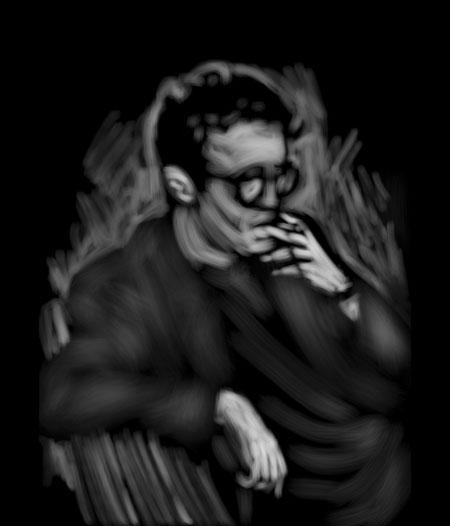bolaño
Augusto Monterroso wrote that, sooner or later, Latin American writers face three fates: exile, imprisonment and the grave. And, in fact, Roberto Bolaño was subject to the second of those fates at that time, during the 90’s: prison. Locked away with hardly any light, working harder than a mule (as his personal diaries, which have now been published, tell us), far away from any literary movement or group, nobody took him very seriously and he just about managed to make a living. That was why he used to send the texts he wrote to many different competitions held all over the world.
And once in a while he would win something or another. In 1994, for instance, he won the Irun Literature Prize for poetry. Los perros románticos was the title of his winning collection of poems, but it has hardly been heard of since then. Later on Bolaño did become better known and Lumen (2000) and Acantilado (2006) republished the book with a forward by the poet Pere Gimferrer. It’s a pity no Basque editor had published the book back in ‘94: it would have been good business. But it was after winning that prize that Bolaño started making his living from literature. At last he was able to forget about all his non literary jobs: a boat cleaner, a camp site guard, a salesman of strange imitation goods, etc.
One of the last prizes he won was the City of Donostia Literature Prize in 1996. He was awarded it for his short story Sensini, winning over a load of other writers who had sent their tests from who knows where. It can’t have been because of the money involved, but Bolaño and his family celebrated the news as if he had won the Nobel Prize rather than a local prize. But there was a problem: the editor Jorge Herralde had been promised that he could publish the short story in a collection with some other stories. Bolaño wrote to Herralde and explained to him that he had send his story to take part in the competition, like any writer who takes part in any competition, and he had never thought he would win. If there were going to be any legal problems about it, Bolaño committed himself to contributing two further short stories, both better than the winning one. It was no good. The collection of short stories Llamadas telefónicas was published by Anagrama. Sensini is the most notable story in the book according to Enrique Vila-Matas.
But in ‘96 Bolaño started writing in a different way, publishing, La literatura nazi en América (“Nazi Literature in America”) and Estrella distante (“Distant Star”). And from then on Bolaño went from success to success, for example with the novel Los detectives salvajes (“The Savage Detectives”) (1998) and his monumental and posthumous 2666 (2004). Bolaño died ten years ago. Bolaño’s unpublished works keep on appearing. And the best thing is that there are still many work to be published. There could even be some unpublished works which he had sent to some Basque literary competitions.
And once in a while he would win something or another. In 1994, for instance, he won the Irun Literature Prize for poetry. Los perros románticos was the title of his winning collection of poems, but it has hardly been heard of since then. Later on Bolaño did become better known and Lumen (2000) and Acantilado (2006) republished the book with a forward by the poet Pere Gimferrer. It’s a pity no Basque editor had published the book back in ‘94: it would have been good business. But it was after winning that prize that Bolaño started making his living from literature. At last he was able to forget about all his non literary jobs: a boat cleaner, a camp site guard, a salesman of strange imitation goods, etc.
One of the last prizes he won was the City of Donostia Literature Prize in 1996. He was awarded it for his short story Sensini, winning over a load of other writers who had sent their tests from who knows where. It can’t have been because of the money involved, but Bolaño and his family celebrated the news as if he had won the Nobel Prize rather than a local prize. But there was a problem: the editor Jorge Herralde had been promised that he could publish the short story in a collection with some other stories. Bolaño wrote to Herralde and explained to him that he had send his story to take part in the competition, like any writer who takes part in any competition, and he had never thought he would win. If there were going to be any legal problems about it, Bolaño committed himself to contributing two further short stories, both better than the winning one. It was no good. The collection of short stories Llamadas telefónicas was published by Anagrama. Sensini is the most notable story in the book according to Enrique Vila-Matas.
But in ‘96 Bolaño started writing in a different way, publishing, La literatura nazi en América (“Nazi Literature in America”) and Estrella distante (“Distant Star”). And from then on Bolaño went from success to success, for example with the novel Los detectives salvajes (“The Savage Detectives”) (1998) and his monumental and posthumous 2666 (2004). Bolaño died ten years ago. Bolaño’s unpublished works keep on appearing. And the best thing is that there are still many work to be published. There could even be some unpublished works which he had sent to some Basque literary competitions.



